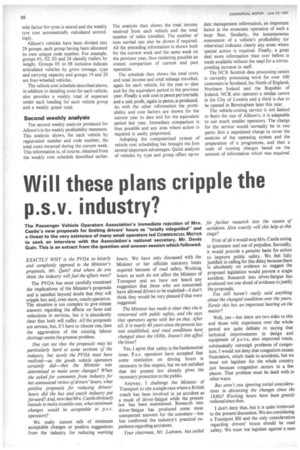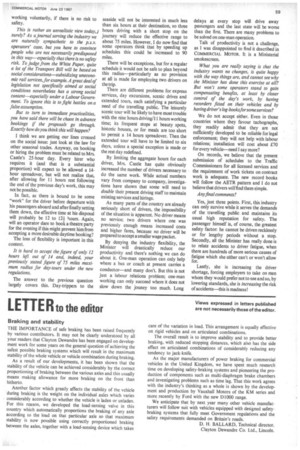Will these plans cripple the p.s.v. industry?
Page 58

Page 61

If you've noticed an error in this article please click here to report it so we can fix it.
The Passenger Vehicle Operators Association's immediate rejection of Mrs. Castle's new proposals for limiting drivers' hours as "totally misguided" and a threat to the very existence of many small operators led COMMERCIAL MOTOR to seek an interview with the Association's national secretary, Mr. Denis Quin. This is an extract from the question-and-answer session which followed.
EXACTLY WHY is the PVOA so bitterly and completely opposed to the Minister's proposals, Mr. Quin? And where do you think the industry will feel the effects most?
The PVOA has most carefully examined the implications of the Minister's proposals and is satisfied beyond doubt that they will cripple bus and, even more, coach operation. The situation is too complex to give simple answers regarding the effects on fares and reductions in services, but it is abundantly clear that both will suffer. All the proposals are serious, but, if I have to choose one, then the aggravation of the existing labour shortage seems the greatest problem.
One can see that the proposals may hit particularly hard at some sections of the industry, but surely the PVOA must have realized—as the goods vehicle operators certainly did—that the Minister was determined to make some changes? When she asked for comments from industry for her announced review ofdrivers' hours, what positive proposals for reducing drivers' hours did the bus and coach industry put forward? And, now that Mrs. Castle obviously intends to make sizeable cuts, what minimum changes would be acceptable to p.s.v. operators?
We really cannot talk of minimum acceptable changes or positive suggestions from the industry for reducing working hours. We have only discussed with the Minister or her officials statutory limits required because of road safety. Working hours as such do not affect the Minister of Transport and we have not heard any suggestion that those who are concerned have allowed drivers to be exploited—I don't think they would be very pleased if that were suggested.
The Minister has made it clear that she is concerned with public safety, and she says that operators agree with her on that. After all, ills nearly 40 years since the present law was established, and road conditions have changed since the 1930s. Doesn't this affect the issue?
Yes, I agree that safety is the fundamental issue. P.s.v. operators have accepted that some restriction on driving hours is necessary in this respect, but we are satisfied that the present law already gives the necessary protection to the public.
Anyway, I challenge the Minister of Transport to cite a single case where a British coach has been involved in an accident as a result of driver-fatigue while the present law has been maintained. Research into driver-fatigue has produced some most unexpected answers for the scientists—but has confirmed the industry's practical experience regarding accidents.
Your chairman, Mr. Lainson, has called for further research into the causes of accidents. How exactly will this help at this stage?
First of all it would stop Mrs. Castle acting in ignorance and out of prejudice. Secondly, it would provide a genuine basis for action to improve public safety. We feel fully justified in calling for this delay because there is absolutely no evidence to suggest the proposed legislation would prevent a single accident. Research into driver-fatigue has produced not one shred of evidence to justify the proposals.
You still haven't really said anything about the changed conditions over the years. Surely this has an important bearing on the matter?
Well, yes—but there are two sides to this and those with experience over the whole period are quite definite in saying that technical improvements in design and equipment of p.s.v.s, also improved roads, substantially outweigh problems of congestion. I would not deny that congestion causes frustration, which leads to accidents, but we must not legislate for the whole country just because congestion occurs in a few places. That problem must be dealt with in other ways.
But aren't you ignoring social considerations in discussing the changes since the 1930s? Working hours have been greatly reduced since then.
I don't deny that, but it is quite irrelevant to the present discussion. We are considering a Transport Bill and the only consideration regarding drivers' hours should be road safety. We must not legislate against a man working voluntarily, if there is no risk to safety.
This is rather an unrealistic view todayd surely? As a journal serving the industry we are naturally sympathetic to the p.s.v. operators' case, but you have to convince people who are not necessarily predisposed in this way—especially that there is no safety risk. To judge from the White Paper, quite a lot of the Transport Bill will be based on social considerations—subsidizing uneconomic rail services, for example. A great deal of legislation not specifically aimed at social conditions nevertheless has a strong social content—especially under a Labour Government. To ignore this is to fight battles on a false assumption.
But to turn to immediate practicalities, you have said there will be chaos in advance bookings if the proposals go through. Exactly how do you think this will happen?
I think we are getting our lines crossed on the social issue: just look at the law for other seasonal trades. Anyway, on booking or hiring the problem must be related to Mrs. Castle's 25-hour day. Every hirer who requires it (and that is a substantial proportion) will expect to be allowed a 14hour spreadover, but will not realize that, after allowing for 11 hours rest following the end of the previous day's work, this may not be possible.
In fact, as there is bound to be some "work" for the driver before departure with his passengers aboard and after finally setting them down, the effective time at his disposal will probably be 12 to 121 hours. Again, will an operator dare to book a theatre party for the evening if this might prevent him from accepting a more desirable daytime booking?
The loss of flexibility is important in this context.
It is hard to accept the figure of only 12 hours left out of 14 and, indeed, your previously stated figure of 75 miles maximum radius for day-tours under the new regulations.
The answer to the previous question largely covers this. Day-trippers to the seaside will not be interested in much less than six hours at their destination, so three hours driving with a short stop on the journey will reduce the effective range to about 75 miles. However, I do now find that some operators think that by speeding up schedules this could be increased to 90 miles.
There will be exceptions, but for a regular schedule it would not be safe to plan beyond this radius—particularly as no provision at all is made for employing two drivers on the trip.
There are different problems for express services, day excursions, scenic drives and extended tours, each satisfying a particular need of the travelling public. The leisurely scenic tour will be likely to have most trouble with the nine hours driving/11 hours working time; its frequent stops at beauty spots, historic houses, or for meals are too short to permit a 14 hours spreadover. Then the extended tour will have to be limited to six days, unless a special exception is made or the rest day redefined.
By limiting the aggregate hours for each driver, Mrs. Castle has quite obviously increased the number of drivers necessary to do the same work. While actual numbers vary from company to company, investiga tions have shown that some will need to double their present driving staff to maintain existing services and hirings.
As many parts of the country are already seriously short of drivers, the impossibility of the situation is apparent. No driver means no service; two drivers where one was previously enough means increased costs and higher fares, because no driver will be prepared to accept a smaller wage packet.
By denying the industry flexibility, the Minister will drastically reduce our productivity and there's nothing we can do about it. One-man operation can only help where a bus or coach at present carries a conductor—and many don't. But this is not just a labour relations problem; one-man working can only succeed where it does not slow down the jouney too much. Long delays at every stop will drive away passengers and the last state will be worse than the first. There are many problems to be solved on one-man operation.
Talk of productivity is not a challenge, as I was disappointed to find it described in COMMERCIAL MOTOR. It is a Ministerial smokescreen.
What you are really saying is that the industry wants no changes, is quite happy with the way things are, and cannot see why the Minister has done this exercise at all? But won't some operators stand to gain compensating benefits, at least by closer control of the day's work, by having recorders fitted on their vehicles and by having driver's log-booksfor some services?
We do not accept either. Even in those countries where they favour tachographs, they readily admit that they are not sufficiently developed to be reliable for legal enforcement; they will not help with labour relations; installation will cost about £70 for every vehicle—need I say more?
On records, we believe that the present submission of schedules to the Traffic Commissioners for all licensed services and the requirement of work tickets on contract work is adequate. The new record books will follow the AETR pattern and I do not believe that drivers will find them simple.
Any final comments?
Yes, just three points. First, this industry can only survive while it serves the demands of the travelling public and maintains its usual high reputation for safety. The passenger himself is, of course, the greatest safety factor: he cannot be driven recklessly or for lengthy periods without a stop. Secondly, all the Minister has really done is to relate accidents to driver fatigue, when there are hundreds of more serious causes of fatigue which she either can't or won't allow for.
Lastly, she is increasing the driver shortage, forcing employers to take on men whom they would prefer not to use and so, by lowering standards, she is increasing the risk of accidents—this is madness!












































































































